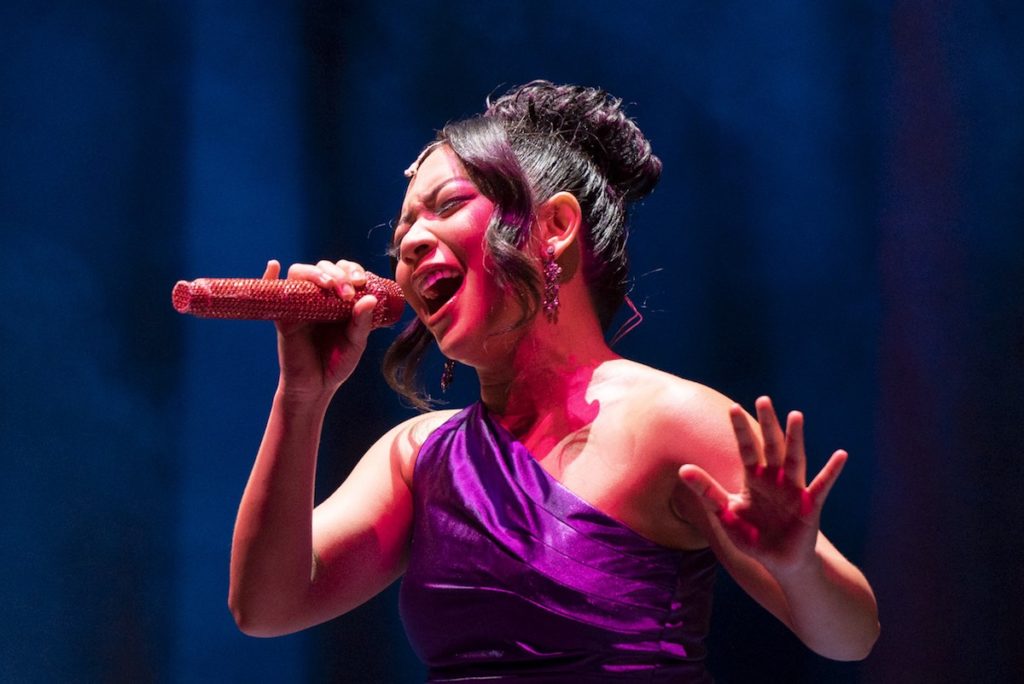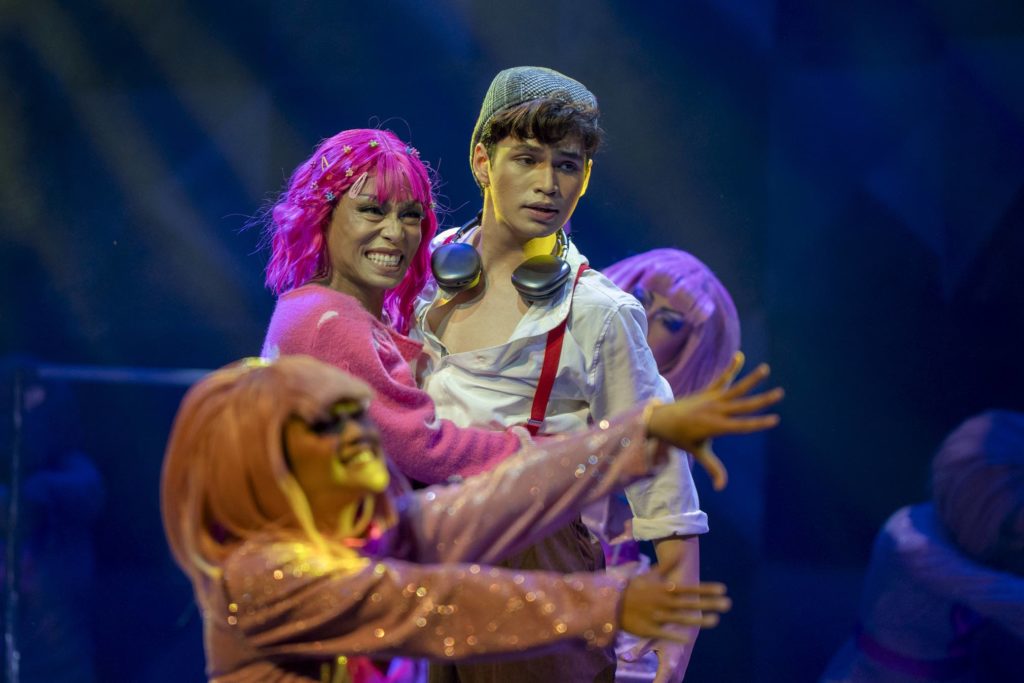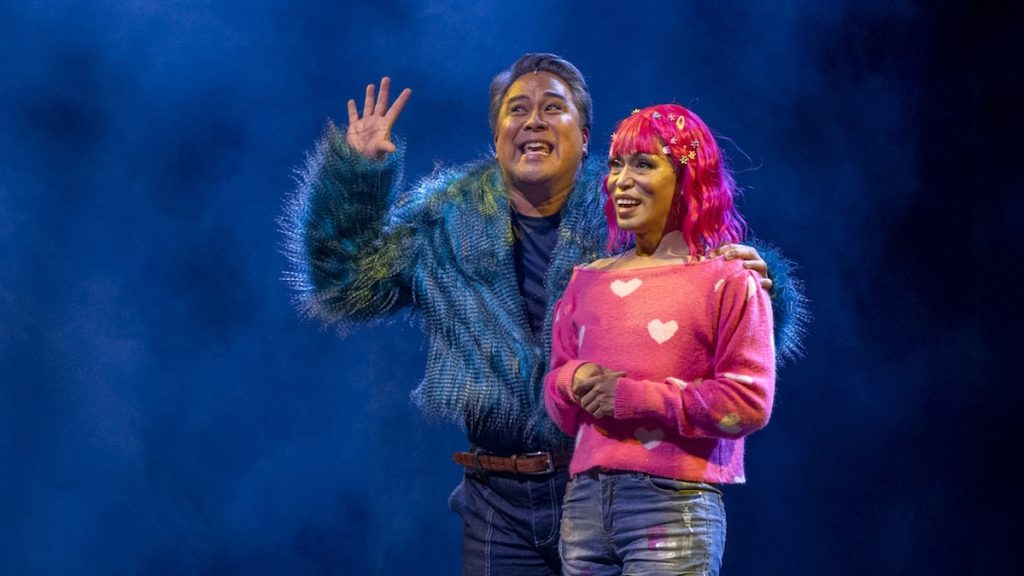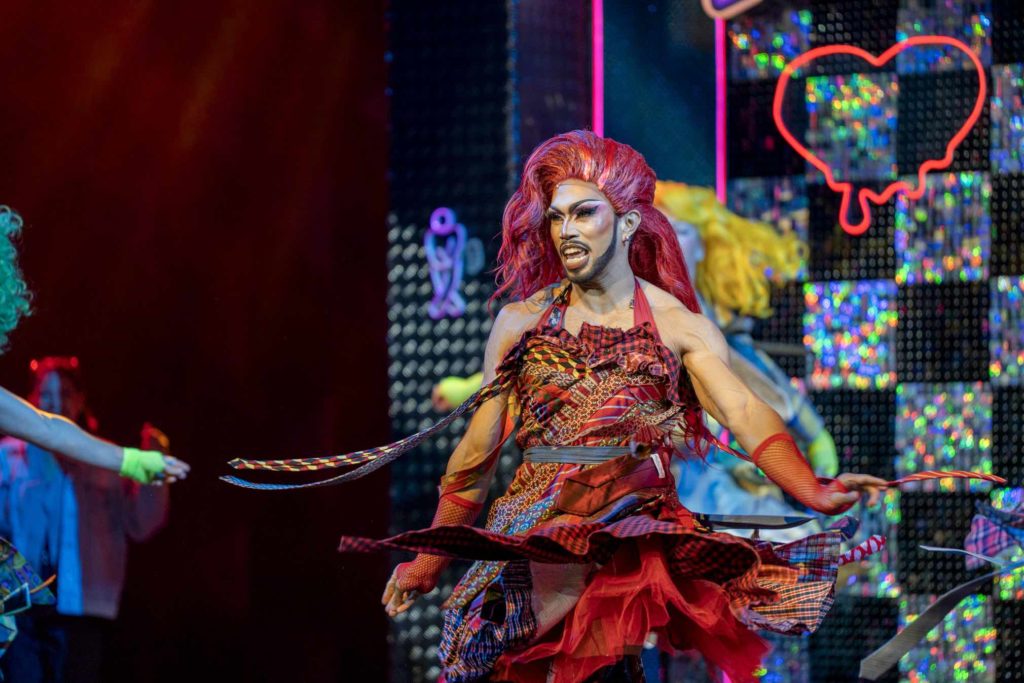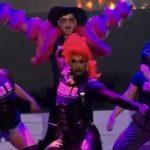Let’s get the obvious out of the way: Representation is always a welcome step towards creating a more egalitarian society. It allows stories that would otherwise be forever outside the pop culture mainstream to take center stage and actually be told. As a society with rigid Asian cultural norms, the Philippines still views the markers of its culture, like music, films, and theatre, through heavily-tinted western lenses. It is therefore important to support local stories that seek to shine a light on the experiences of marginalized and underrepresented groups within the medium. Delia D., a new musical directed by Dexter Santos, written by Dolly Dulu, featuring the songs of Jonathan Manalo, and currently playing at the Newport Performing Arts Theater, is a great example of a musical that tells a unique and original story about a drag queen who dared to dream big.
We are introduced to Delia, played by Phi Palmos, a sincere, somewhat naive drag queen from the province who dreams of stardom as a serious singer. As she works as a drag entertainer, she faces mockery and discouragement within her adoptive family, the House of Eme (Take note of this; this will be important later). Even her own house mother, Mama Eme (John Lapus), tells her to stick to what she’s good at: lip-syncing. The interesting part of this characterization is that despite all of this negativity, Delia’s resolve is full and intact: She will become a star; it’s only a matter of time. She’s given her shot when auditions for “Idol of the Galaxy,” a talent search developed by a national TV network, open, and she secures a spot in the competition by performing a number that’s less about vocal performance and more about spectacle. This is one of the first of the many rhinestone-encrusted red flags when it comes to the messaging of the musical. Along the way, she meets fellow contestants Kiki (Shaira Opsimar), Raymond (Omar Uddin), Billy (Alfritz Blanche), Sheryn (Natasha Cabrera), and Phoebe (Chaye Mogg), as well as the show runner Sir T (Floyd Tena).
For the whole first act, we are taken on a whirlwind tour of the inner workings of this fictional talent show. We see the evolution of Kiki, the mousy, shy, and introverted powerhouse belter, as Delia eventually takes her under her wing, and the evolution of Delia herself. Sensing Delia’s potential as a commercial draw due to her unique and larger-than-life personality, Sir T resolves to skew the competition in her favor, christening her with the somewhat disingenuous name “Delia D.,” where the meaning of the “D.” is left for her audience to define. It also just happens that Delia’s longtime idol, Mamon (Tex Ordonez-de Leon), a bitter, aging has-been, has her eye out for Delia, who she perceives as a fraud for the simple, short-sighted reason that she can’t sing the same way as everybody else. Mamon believes that Delia only got into the competition because of her flashy costumes and antics and arbitrarily and inexplicably decides to destroy her. Ultimately, Delia D. triumphantly prevails in the finals and ends up being showered with all the fame and glory she has worked so hard to get, and the curtain comes down.
The second act reveals the other side of the story. With success under her belt, Delia D. is now the most popular thing since sliced bread. She has multiple product endorsements, box-office hits, and other trappings of success. She is excited to launch an album, but this becomes a bittersweet development since it’s revealed that she hasn’t been recording the kind of “serious” music she wants to do but is instead relegated to recording novelty songs. Nevertheless, life is good, until Mamon resurfaces with a glowed-up Kiki, who one can only presume has been fed poison by Mamon into believing that she was more deserving of the title than Delia D. Faced with the pressure, Delia D. begins to entertain moments of self-doubt. Meanwhile, Sir T and his boss, media executive GVB (Mimi Marquez), watch this drama brewing, taking note of the sharp and sudden shift of public attention from Delia D. to Kiki. The latter resolves to stoke the fire by making the two divas face off in a reunion battle, with the ultimate goal being to sign the victor and continue exploiting their talent as planned. Delia D.’s confidence swiftly evaporating amidst the stress, she breaks down during the showdown and is humiliated beyond imagining. In the end, she is left with nothing, surrounded by her family who only seem to care but easily could have been just relieved that they were proven right: that she never had what it takes in the first place. They welcome Delia back into their painfully mediocre lives in a flashy drag finale.
On the surface, it is a beautiful show. The production design is something you have come to expect from Newport World Resorts musicals. The production is positively drowning in money, from the costumes (Mitoy Sta. Ana) to the set pieces (Lawyn Cruz) to the live musical accompaniment (Manila Philharmonic Orchestra). The production looks and feels expensive. One wishes it sounded expensive as well, but there seems to be some issue with either microphones that are showing their age or a sleepy tech booth. The performances of the cast were also on point; Phi Palmos in the titular role is endearing and sympathetic, his portrayal of Delia D. and her earnest pursuit of fame is authentic and relatable. The vocal performance of Shaira Opsimar is likewise commendable, but it was so difficult to truly appreciate it because of the aforementioned challenges with the sound system. The musicality and score are really rather good; even people who are not familiar with Jonathan Manalo’s entire discography would definitely be able to enjoy it.
If you wanted to be entertained without reading too much into the politics of the underlying message of the show, this would be a good place to stop reading. You have been warned.
Unfortunately, the messaging of the play is deeply problematic. We need to talk about three major themes found within the plot. The first is toxic Filipino culture and the hypocrisy of the drag family dynamic in the show. Delia has a “found family” in the form of The House of Eme. We see these drag sisters and mother light-heartedly discouraging her from pursuing her dreams from the beginning. Delia D. eventually achieves her goal, and somehow it feels like her family expected something in return. Mama Eme expects some kind of stardust to rub off from Delia D. and ensure a thriving business for her and her girls, and when it doesn’t, she goes so far as to host the launch of Kiki 2.0 at the very same club Delia D. calls home, shrugging her shoulders and justifying the act as part of survival, as if the rise of Delia’s star was solely responsible for her club’s decline. One dramatic centerpiece was an indictment of Delia D. by her entire drag family, accusing her of being delusional enough to think that she could’ve succeeded without their help, as if a few gowns and some make-up were what made Delia D. such a magnetic character in the first place. At one point, they defiantly assert that “Drag doesn’t mean you drag others down,” which is ridiculous since that’s what they’ve been doing to Delia D. the entire time. It wouldn’t have killed the show for these girls to actually hold Delia up, not read her to filth. It comes across as no different from toxic family members who feel entitled to handouts just because you’re successful. It’s portrayed in this show as a moral high ground, which is a bizarre proposition to accept given their actions.
The next problematic theme is the apparent corruption in the entertainment industry. While it may be true that things like vote-rigging and absurdly controlling talent contracts actually do happen, the issue with its depiction in the show is that the people responsible suffer no real consequences. Sir T does get fired, but only to ostensibly find another job at another network, and the network exec GVB signs Kiki as a talent after Delia’s breakdown and issues a vague statement about how the scandal is to be investigated. There are no consequences to the serious amount of emotional and professional damage their decisions have wrought on innocent people. The show had the opportunity to make a statement by showing some measure of accountability but falls short of making one: their failure is tantamount to complicity in the corrupt system they satirize in the show.
And perhaps the worst narrative thread in this show is that Delia D. had no business dreaming a dream that big. From the first scene to the last scene, it is a constant barrage of discouragement for Delia, from her drag family to Mamon to her manager. It is a monumental climb that was an effective narrative device to convince the audience—to make them sympathize and cheer for Delia D.’s success. Delia is constantly reminded that she’s not good enough, even though she is good enough, and the public agrees. She may not be conventionally talented or beautiful, but she is singular. Her narrative arc, where nobody is held accountable for their actions except for Delia D., is telling on a deeper level. The main message of the show is less about pursuing your dreams and more about determining what you’re good at and just sticking to that—hardly the kind of message you’d want to say to a long-discriminated and oft-exploited group. Incredibly, we end the show exactly where Delia started—and where Mamon emphatically wants her to stay—in the same old gay bar she came from. The LGBTQIA+ community has long been told to “look pretty and say nothing” in this country. The LGBTQIA+ community’s long history of being relegated to boxes, separate and detached to allow straight people their comfort, is lost on the creative team behind this musical.
Honestly, for a musical about a drag queen, its agenda looks and smells awfully straight. It gives me no satisfaction to raise these issues, but as creatives, we have a duty to inspire our audiences and come up with material that doesn’t only look pretty but must also have something to say. It is not enough to have queer characters tell queer stories. These stories have to have some value. In the end, there is no lesson to be learned here, no point made, and no reason to revisit Delia’s story. In the end, the bad guys won. We deserve representation, but if this show is to be believed, like Delia D., we didn’t deserve to win.
‘Delia D.: A Musical Featuring the Songs of Jonathan Manalo runs until June 8, 2025. Click here for more stories like this. You may also follow and subscribe to our social media accounts: Facebook, YouTube, Instagram, TikTok, Twitter, and Kumu.



